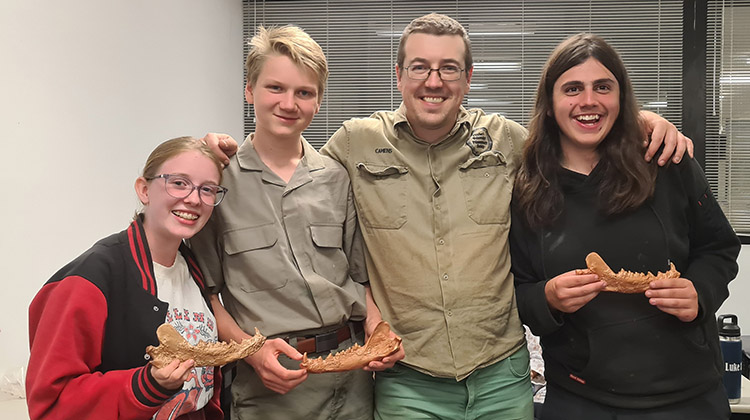Fossil Tour of Discovery for High School Students

Three high school students this year were given the opportunity to join an action-packed Flinders University field trip to the Wellington Caves in NSW to find out more about a key fossil site where the remains of long-forgotten animal species are being unearthed.
With help from the James Moore Memorial Palaeontology Prize, the students explored the deep past of the continent, all returned with glowing tales of their experiences and insights into ancient Australia. Flinders University is inviting applications from across Australia to join next year’s field trip.
Jack Wilson, from Kangaroo Island Community Education School, says a highlight was finding a megafaunal echidna claw bone and also visiting the Canowindra fish fossil site.
“I found the experience of real palaeontology amazing and inspiring. The discovery of organisms vastly pre-dating us, of which fossils are the remains, has never ceased to excite me,” he says, who appreciated the week-long program as “a great way to learn”.
The field trip also provided students with an understanding of how fossil species give insights into our understanding of modern flora and fauna.
Salisbury High School student Matilda Coventry says she was lucky to find a red kangaroo tooth and fragments of a rodent’s skull.
“The highlight of the expedition was going in the pit and uncovering a large vertebra. It was also great to meet the Flinders palaeontologists and students, and be able to join lectures and view the fish museum,” she says.
Fossil fish expert Dr Alice Clement, a supervisor on the April 2025 field trip, says the students were able to visit the famous Canowindra ‘fish kill’ site, which preserves a snapshot in time 363 million years ago when thousands of fish died in a drying billabong, “The combination of the Wellington Caves site and Canowindra fish beds exposed students to a really wide temporal range, taxonomic diversity and taphonomic processes, showing how things are preserved,” says Dr Clement.
The third prize winner, Ethan Davidson from Springbank Secondary College, said, “fossils can tell us a lot about how an animal lived, which I think is very interesting and thought provoking”.
“Some fossils are just so strange and I can’t help but love how diverse life on our planet is, especially in the past. I would love to contribute to better understanding life millions of years ago.”
Professor of Palaeontology Gavin Prideaux says the Wellington Caves site provides one of the most detailed records in Australia of faunal and floral change in one area from before humans arrived, through to the first 20,000 years of human presence in the region.
“This provides us with an opportunity to explore the impacts of climatic changes and human activities on regional plant and animal communities, and is an ideal training ground for budding fossil hunters enrolled in Australia’s only palaeontology degree at Flinders University,” says Professor Prideaux, director of the Flinders Palaeontology Laboratory.
High school students from around Australia can apply now to take part in the 2026 field trip. Each year the prize is awarded to a metropolitan and rural high school student, with $400 in prize money and their field trip expenses covered. South Australian and interstate high school students are welcome to apply. The James Moore Memorial Palaeontology Prize was established in 2016 to honour Flinders University palaeontology student James Moore from Whyalla who died in a car crash.
Details on how to apply for the 2025-26 prizes – which are open to Year 10-11 secondary school students across Australia until 5pm on Wednesday 17 September – can be found on the Flinders University website here.